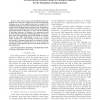Free Online Productivity Tools
i2Speak
i2Symbol
i2OCR
iTex2Img
iWeb2Print
iWeb2Shot
i2Type
iPdf2Split
iPdf2Merge
i2Bopomofo
i2Arabic
i2Style
i2Image
i2PDF
iLatex2Rtf
Sci2ools
110
click to vote
IAT
2010
IEEE
2010
IEEE
An Interaction-Oriented Model of Customer Behavior for the Simulation of Supermarkets
Abstract--Since several years, great distribution firms implement more and more complex layout and shelf allocation strategies, so as to force empirical know-how to combine with Artificial Intelligence tools. Thus simulation has become an essential tool for designing efficient article layouts. Mathematical models based on statistical observations have been replaced by agent-based models. In this paper we argue that the modelling of individual behaviors of customers in a supermarket must be done through interaction-oriented approaches, in order to allow large-scale simulations and flexible models. Our model, based on our IODA methodology, is part of a "Serious Game" dedicated to vendor training. It takes into account the diversity of customer preferencies, the location of articles, and the side-effects of customer moves, so as to measure the consequence of management choices on the global outcomes of the supermarket. Keywords-Supermarket Simulation, Individual-Based Models Des...
Related Content
| Added | 11 Feb 2011 |
| Updated | 11 Feb 2011 |
| Type | Journal |
| Year | 2010 |
| Where | IAT |
| Authors | Yoann Kubera, Philippe Mathieu, Sébastien Picault |
Comments (0)

